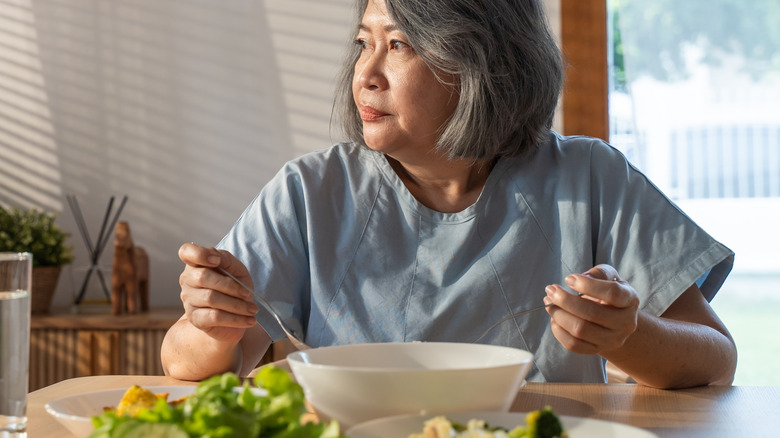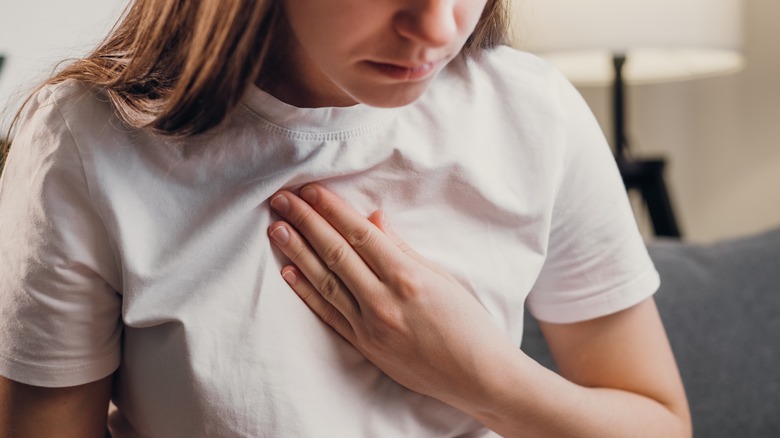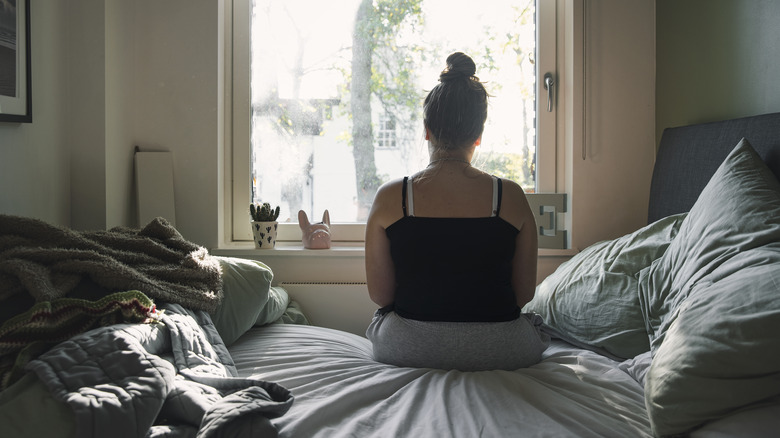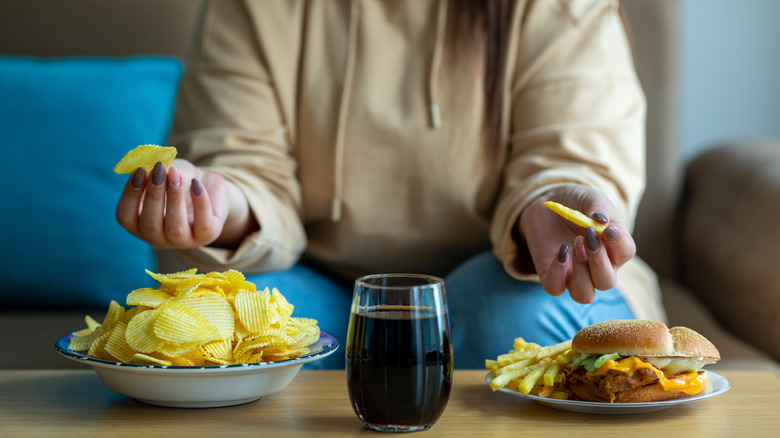Strange Things That Happen To Your Body When You Eat Alone Every Day
For some people, eating alone is a choice. They prefer the solitude and peace and quiet that come with enjoying a meal by themselves, particularly in the middle of a busy day. For others, such as elderly people who live on their own, solitary dining is more of the norm. In either case, while the occasional lunch break may be OK, eating alone for every meal could present some risks to your health.
A 2021 study published in the International Journal of Environmental Research and Public Health showed that students who lived alone and dined solo more often had a higher rate of depression than those who did not. Similarly, a 2023 study published in Appetite showed that eating alone presented high risks for such health issues as malnutrition and depression. In addition, people who eat alone tend to not eat as many healthy foods or home-cooked meals and also have smaller portion sizes, which could lead to inadequate nutrition.
You may feel depressed
Eating alone can have an impact on your mental health, as it turns out. A survey conducted by Oxford Economics put eating alone as one of the strongest links to unhappiness and depression, perhaps second only to mental illness. Additionally, a 2021 study published in the Korean Journal of Family Medicine showed that people who ate dinner alone had higher rates of depression and suicidal ideation than people who ate with others.
It's not only the solitude that can contribute to depression, according to a 2015 study published in Age and Aging. That study illustrated two potential reasons why eating alone could result in depression. The lack of social interaction is one factor, as people who eat together feel a greater sense of belonging and more like they are part of a community. On top of that, people who eat alone tend to eat poorly, in part due to not having healthy ingredients and also feeling unmotivated to cook a healthy meal.
If you or someone you know needs help with mental health, please contact the Crisis Text Line by texting HOME to 741741, call the National Alliance on Mental Illness helpline at 1-800-950-NAMI (6264), or visit the National Institute of Mental Health website.
Your heart could be affected
Dining on your own could present some surprising health risks, including ones to your heart. A 2022 study published in Menopause revealed that older women who ate alone were 2.58 times more likely to develop angina and symptomatic heart disease than those who shared two or more meals a day with other people. A lot of this can be attributed to poor nutrition, per the study.
According to The Insider MD, people who eat alone tend to binge eat and suffer from stress, which can be bad for your heart in the long run. A 2023 study published in the European Journal of Preventive Cardiology revealed that stress and emotional eating can result in cardiovascular damage. Emotional eaters tend to binge eat when stressed, and then eat less at other times, which can create an unstable pattern of eating that can damage the heart. The study showed that stress level was responsible for 32% of the link between emotional eating and cardiovascular problems.
You could experience metabolic syndrome
There are a number of conditions that add up to metabolic syndrome, including high blood pressure, elevated blood sugar, and excess fat around the midsection (via the Mayo Clinic). People who have metabolic syndrome are at risk for developing certain conditions, including type 2 diabetes and heart disease. The condition can even cause a buildup of plaque in the arteries, which can lead to a heart attack or stroke.
A 2018 study published in Obesity Research & Clinical Practice reviewed health data from more than 7,000 adults living in South Korea. The study showed that men who ate alone had a 45% increased risk of obesity and a more than 60% increased risk of developing metabolic syndrome. The risk was particularly high in the case of unmarried men. Women who ate more than two meals a day alone were 29% more likely to develop metabolic syndrome than women who ate with others.
Your weight can go up
It may not seem likely, but eating alone can actually cause you to put on some unwanted pounds. A 2020 study published in the International Journal of Environmental Research and Public Health showed that people who have family dinners tend to focus more on what they're eating and are better able to manage their portion control. On the other hand, people who eat alone are not as conscious of the nutritional value of their meal or how much they're eating.
There are a number of reasons that a solo meal can impact your waistline (via Women's Health). For one thing, people who eat on their own aren't likely to set the table for themselves. It's more realistic to presume that they'll be grabbing something on the go, probably in their car. That usually means that they'll be consuming high-calorie, unhealthy foods from places like a fast food restaurant or a convenience store. In addition, eating alone deprives one of the conversation breaks and pauses between bites that give your body time to realize it's full. As a result, lone eaters tend to speed eat and consume way more than their bodies need.
Your immune system can be affected
Eating alone and social isolation in general can have drastic effects on you, not just physically, but mentally as well. A 2019 study published in Brain, Behavior and Immunity showed that, when exposed to Salmonella typhi bacteria, lonely people experienced an overactive immune response. In addition, people who are socially disengaged can produce more chemicals in the body that promote inflammation (such as fibrinogen), as evidenced by a 2021 study published in Frontiers in Behavioral Neuroscience.
According to a 2021 study published in the International Journal of Environmental Research and Public Health, loneliness has the ability to have an impact on the body's cytokines, growth factors, antibodies, and the activity of the immune cells. In addition, metabolic processes in the body can also be affected, which can have an impact on stress responses, fat metabolism, blood sugar control, and even cognitive behavior and mental health.
Your blood pressure could spike
The stresses that affect your body as a result of loneliness and social isolation can also cause your blood pressure to spike. A 2010 study published in Psychology and Aging showed a clear link between loneliness and high blood pressure, particularly in lonely people 50 years of age or older. The study followed more than 200 people between the ages of 50 and 68 who, according to survey questions, identified as lonely. Over the course of a four-year study period, researchers showed that these lonely people had steady increases in blood pressure versus people who were not lonely.
Additionally, a 2018 study published in Scientific Reports showed that social isolation was associated with a 60% to 70% greater chance of death over a seven-year period. This was bolstered by a 2018 study published in the Journal of the American Heart Association, which showed that social isolation was associated with an increased risk of death. In fact, people who were socially isolated had a risk of death that was 3.5 times higher than those who were not.
You can experienced increased inflammation
Believe it or not, being alone and socially isolated, when you eat or at other times, can actually trigger inflammation in the body. A 2024 study published in Brain, Behavior, and Immunity showed a correlation with social isolation and inflammation, in both patients with medical issues and the general population. The study showed that children who experienced social isolation had higher levels of a protein called soluble urokinase plasminogen activator receptor, or suPAR. This protein can indicate inflammation in the body. Higher suPAR levels were also found in middle-aged adults who experienced feelings of loneliness.
These findings were corroborated by a 2015 study published in the Proceedings of the National Academy of Sciences. That study showed that loneliness activated the "fight or flight" response in the body, which affected the production of white blood cells. The researchers looked into how genes behave in immune cells known as leukocytes. Leukocytes help protect the body from infections, and loneliness appeared to trigger changes in their behavior, including an increase in genes that cause inflammation.
You can develop social isolation
Loneliness and poor eating habits tend to go hand in hand, according to a 2012 study published in the Journal of Psychology. That study showed that loneliness can exacerbate certain eating disorders such as binge eating, anorexia nervosa, and bulimia. The two behaviors become linked, as eating becomes a means of coping with loneliness. However, it does not address the core issue, and the person becomes trapped in a cycle of feeling lonely and eating to combat those feelings.
Eating disorders can also impact one's personal relationships (via the Center for Eating Disorders & Severe Malnutrition). Because they want to avoid people seeing their eating habits, commenting on them, or putting pressure on them to change their eating habits, they will often choose to eat alone. Over time, they will also begin to spend more and more of their time by themselves, cutting themselves off from friends and loved ones.
You can make poor food choices
Research shows that when eating alone, we don't often tend to make the best choices. A 2018 study published in the Journal of Nutrition Education and Behavior showed that adolescents who ate alone were more likely to be overweight or even obese than those who ate with others. Adolescents who ate alone, according to the study, were more likely to order takeout food or consume junk food and sugary beverages without parental supervision.
People who eat alone may also engage in distracted eating, as evidenced by a 2013 study published in the American Journal of Clinical Nutrition. That study showed that people who eat while occupied with other activities tend to eat more and may also be hungry again later. The brain takes approximately 20 minutes to register that you're full, and eating while distracted may cause you to ignore those signals and keep eating long after you've had your fill.









